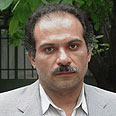
Iranian physicist acquainted with Israeli scientists
Washington Post reports Professor Massoud Mohammadi, who was murdered in Tehran, participated in international project alongside Israeli physicists, among others. 'We met in unofficial meeting, but never talked politics,' Israeli scientist says
Professor Massoud Mohammadi, 50, the Iranian physicist who was murdered in a mysterious assassination in Tehran, participated in an unique project alongside Israeli scientists, among others, the Washington Post reported Tuesday.
SESAME, a project on synchrotron-light for sxperimental science and applications in the Middle East, joins together researchers from many Middle Eastern nations including Iran, Pakistan,Jordan, Egypt, Morocco, Israel and the Palestinian Authority.
The project is based in Jordan and in 2002 it launched a synchrotron - a form of an advanced particle accelerator. The project enables scientists to learn about the structure and behavior of molecules, atoms and crystals for studies in protein research, drug development as well as bio-technology.
SESAME operates under United Nations auspices and is in the forefront of world scientific research.
Mohammadi, who is considered an expert on particle and theoretical physics became acquainted with the Israeli delegation as part of SESAME conferences, however the extent of the contacts between the parties is unclear.
The Iranian and Israeli participation in the project is unusual because the two countries have had no ties since the 1979 Islamic revolution. The last SESAME conference was held in Jordan last November.
The Israeli representative Eliezer Rabinovich, director of the Institute for Advanced Studies at the Hebrew University of Jerusalem told the Washington Post that he had spoken to the Iranian physicist during an informal meeting.
"We did not discuss politics or nuclear issues, as our project is not connected to nuclear physics," Rabinovich said. He asked Mohammadi whether Iran was interested in building its own particle accelerator but received no clear answer.
Rabinovich noted he barely knew Mohammadi and has "no idea whatsoever" why he was killed.
Moshe Paz-Pasternak, a scientist from the Tel Aviv University who also attended the Joran conference described the Iranian professor as a friendly and humorous person.
'No direct meetings'
According to the Swedish SESAME representative there was a possibility that Mohammadi has spoken to Israeli delegates during the meetings. However, Javad Rahighi, an Iranian nuclear researcher involved in the project strongly denied that there had been any direct meetings between his delegation and the Israelis. "They are present in the same room, but there are no direct meetings."
Rahighi serves as vice chairman of SESAME's international training program and has a connection to Iran's atomic energy committee. "We are all shocked," he said. "I couldn't imagine anybody wanting to kill him. He was a scientist, nothing more."
Mohammadi's colleagues who worked closely with him noted he was a serious scientist who had no interest in politics.
It should be noted that currently there is no known connection between his participation in SESAME and the assassination.
Iranian authorities have placed the blame for the murder on Israel and the US and described Mohammadi as "a firm believer in the Islamic system," while local opposition elements claimed that Mohammadi was a reformist and was taken out by the government, which had discovered he intended to seek asylum in Sweden.
Jonathan Weber and Dudi Cohen contributed to this report










